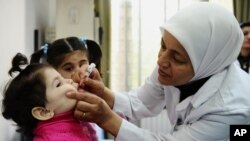The World Health Organization warns hundreds of thousands of people in Syria are at risk of life-threatening illnesses this winter because the country’s broken health system is ill-equipped to care for them.
Before the war, Syria had a well-functioning health system that kept illnesses in check. But, now, five years into the conflict, Syria’s health care system is in shambles. The World Health Organization reports nearly 60 percent of the country’s public hospitals are either partially functioning or closed. And the same situation is true for half of all primary health care centers.
WHO's representative in Syria Elizabeth Hoff says conditions in the still functioning health facilities will get worse as winter sets in. She says these facilities have problems with electricity and water supplies; few hospitals have generators that work and fuel is in short supply.
“I would say that the most serious situation is, of course, the threat of communicable diseases. But as we are moving out of the hot season and into the cold season, we have more problems vis-à-vis respiratory illnesses, particularly in children and elderly and [from] influenza. So we are trying to make influenza vaccines available to the most vulnerable groups," said Hoff.
Hoff says it is extremely difficult to operate in a conflict situation like Syria. She says it is almost impossible to gain access to millions of people in need. She notes 3.2 million people live in hard-to-reach areas and about 350,000 are living in besieged areas.
She says it is particularly difficult to have access to some 1.7 million people living in areas under the control of the so-called Islamic State.
“Access is the principal concern — not only to reach [civilians] with supplies, but also for patients to reach the health services and for health workers to reach their work place. So, this is not only in these hard-to-reach areas, but it is also difficult even in Aleppo city, in the western part, which is controlled by the government," she said.
Hoff says communicable and chronic diseases are not the only concerns. Every month, she says, more than 25,000 people are newly wounded in the war, and need trauma care; unfortunately, few surgical supplies are available.
On a more positive note, Hoff says, a cholera outbreak in Iraq has not yet spread into Syria, and national polio vaccination campaigns have succeeded in keeping that crippling disease at bay.




